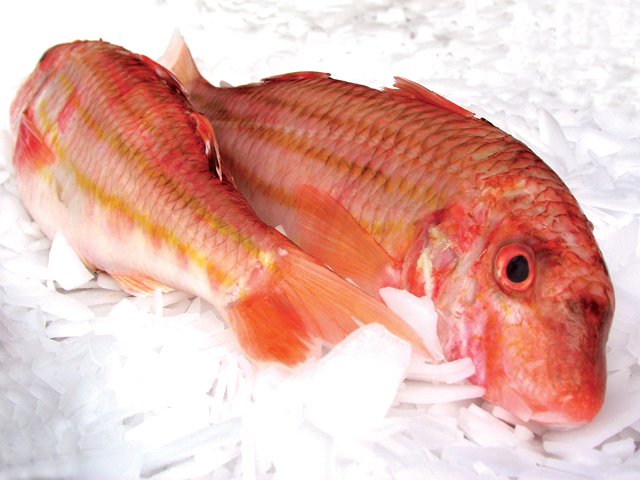
Fishing for Compliments
by Meredith Escudier
Mignon is a word I learned in the first few months of studying French along with my classmates in El Cerrito, California. The word came directly out of the mouths of Robert and Suzanne, two French children who regularly visited our class via the then modern miracle of audio tape. Over and over again, with unfailing chirpiness and tireless regularity, they repeated the word mignon to describe the irresistible cuteness of their dog, Médor, while exhorting their American counterparts to a musical repetition at once crystalline and nasal. We did our best to imitate Robert and Suzanne in the space provided or at least we were game to try, even though most of us were quite hopeless at mastering the nasal vowels, the whispered R and the mysteriously lifted sounds.
Qu’il est…Suzanne would say…KEEL-LAY…we would venture…mignon…MEAN-YAWN…came our reprise once put through the ringer of an honorable American twang. Actually, it was more like MEAN –YAWN-YAWN- YAWN by the time the slowest enunciators caught up with the rest, creating a wave-like effect as it washed tsunami-like over the rows of our desks. Nevertheless, the more gifted pupils in our eighth grade class (that would include close friends Debbie, Cindy and Kathy in addition to the slowly transmogrifying moi) imitated Suzanne’s sing-song soprano with such engaged, unembarrassed perfection that qu’il est…pause…mignon would haunt us for decades to come, popping out unbidden at odd moments—in boardrooms, courtrooms, classrooms.
Mignon, meaning cute, would have further applications as I learned throughout my future years in France. A child is mignon, a dress is mignonne, even a touching, heartrending behavior could be viewed as mignon. Still, I was taken by surprise when my (French) cooking husband qualified two tiny red mullet as mignons. Fish? Mignon? Could this be right? True, I knew that filet mignon occupied a place in the international hall of meat fame, but the words existed as a set expression, I reasoned, specifically for that choice cut of tender beef from the center of a sacrificed bovine. The mignon part of the phrase was not negotiable and could not be supplanted by another option, say, filet charmant. No, filet mignon acted as a fully-formed noun: a person, place or thing. But as my years in France grew into decades, I had an opportunity to measure the full scope of mignon—from pets to children to hairclips to patterned hose to meat to fish, maybe even to a particularly pretty gizzard (on a good day). In any case, the little fish lying in wait on a shelf in our refrigerator were even more than mignons. In the words of Jean-Pierre, they were très mignons, which gave them a personal seduction above and beyond generic mignon.
Très mignons…and he was right. They were subdued yet cunning, supine and inviting, pink and plump and so recently frisky and flitting about in the Mediterranean’s blue waters prior to being scooped up and away by a heavy, tightly-woven fishnet. Their “mignon-ness” completely intact after a short stay at the fish market, they had then made their way to our home swinging along in a color-coded blue plastic bag (blue for the sea, bien sûr) finally to be vigilantly steamed by Jean-Pierre and lovingly displayed on octagonal plates in an act that was already clearly mignon in itself.
We set about consuming them—quietly, sweetly, slowly (and for my part, in as cute a way as possible)—sliding off little bits of filet from their tiny tender spines under the weight of our prying forks and knives. Très très mignons.
“Jean-Pierre, did you fry them or steam them this time?” My unawareness could be forgiven as I was still suffering from jet lag and two white nights.
“I steamed them,” he said. “That way we appreciate their freshness.”
Ah, oui. No need to dress them up with a buttery sauce or a gratuitous sprinkling of shallots or a steamy smothering of thyme or tarragon. No need to sizzle them, grease them or fiddle with their basic essence. We will be happy to settle for the white flesh, a few grateful bites and a growing feeling of gladness that only exposure to the truly mignon can bring. In fact, this may be the culmination of mignon. Forget your furry pets and stuffed animals, your Paisley-patterned, vintage tie and that recently acquired pink, polka-dotted scarf. They don’t begin to touch mignon. In fact, in the world of mignon, nothing matches my mullet. Somehow, between chews, I knew, I truly knew, that the cuteness of Fish-on-a-Plate had been unfairly overlooked and Jean-Pierre, in all of his unself-conscious appreciation (not to mention his astounding mastery of the French language), had opened my eyes to a new approach, a new vision, a new angle. This sweet little darling little mullet o’mine? Oh là là, qu’il est…um…pause (don’t forget the pause)…mignon.
 Meredith Escudier has lived in France for 30-odd years, teaching, translating and raising a family. She is the author of Scene in France…from A to Z and Frenchisms for Francophiles. Her essay, “Fishing for Compliments,” is part of a forthcoming food memoir.
Meredith Escudier has lived in France for 30-odd years, teaching, translating and raising a family. She is the author of Scene in France…from A to Z and Frenchisms for Francophiles. Her essay, “Fishing for Compliments,” is part of a forthcoming food memoir.

3 Comments
Wonderful and informative article by this talented writer. We should all know the meaning and usages of “mignon.”
Fantastique, cousin Meredith. Love it!
Only Meredith could concoct a culinary tour-de-force around a single lovely word. Super!